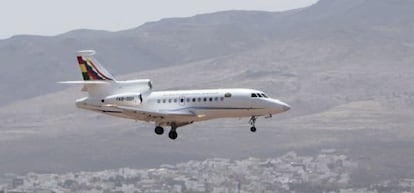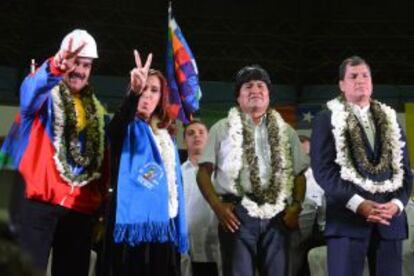The night Spain wanted to search Evo Morales’ plane
Bolivian president recalls the 14-hour ordeal after four nations closed off their airspace Spanish ambassador tried to find out if wanted US whistleblower Snowden was on board

On July 2, Bolivian President Evo Morales found himself at the epicenter of a diplomatic embroilment that involved four European nations, including Spain, when his plane was prohibited from flying over their airspace. Spanish authorities were tipped off that wanted former US intelligence contractor Edward Snowden, who is trying to seek asylum, was on board Morales’ presidential plane.
When Morales finally arrived in Bolivia, following a near 14-hour delay in Vienna, he told supporters his version of the events that occurred from the moment he left Moscow, where he had been on an official visit.
“I was very content and satisfied when I boarded the plane. We had an excellent meeting with Vladimir Putin of the Russian Federation. In Moscow, they told me that everything was ready for the return trip, with a flight plan from Russia to Portugal, Guyana and La Paz.
“Just before I met with Putin they told me that for technical reasons, we could not land in Portugal. Later I found out that there were no technical reasons.
We respect international treaties . . . there is no way I was going to take Snowden to Bolivia"
“I called comrade David Choquehuanca, the foreign minister, to explain the situation. He was able to get permission for us to land in Las Palmas in Gran Canaria. The flight plane was approved so there were no longer any worries.
“I was still thinking about our success in Russia when the pilot of our plane, Air Force Colonel Celiar Arispe, commander of the Presidential Air Group, told me: ‘They canceled our authorization and we cannot enter France.’ We were just minutes away from reaching that territory. We were shocked and worried.
“The first option was to return to Russia but we ran the risk of running out of fuel. The pilot contacted the control tower in Vienna and asked for permission to make an emergency landing because we had no fuel.
“I cannot understand who has the power to divert a presidential plane and force us to make an emergency landing.
“Then the Spanish ambassador in Austria [Alberto Carnero] arrived. He said we could go to Spain but first he had to search the plane. I asked him: why do you have to search the plane? He mentioned Snowden. I told him that I knew that man from the media reports but didn’t know him personally.
“We respect international treaties and for that reason there is no way I was going to take anyone to Bolivia.
We weren't going to give Spain or any other country the pleasure of searching the plane
“The ambassador was in constant contact with Spain’s deputy foreign minister [secretary of state]. When I told him that, he got up and left. When he was leaving he said he was going to ask his deputy foreign minister. He returned to the small office we were using at the Vienna airport and told me that there was an agreement to search the plane between the foreign ministers. Our foreign minister didn’t say a word about that.
“The ambassador was accompanied by two officials. I told him: you are not going to search this plane. If you don’t believe what I am saying, that I have nobody on board, then you are treating me like a liar; you think that President Evo lies. But this president doesn’t lie.
“He left again to speak with the deputy foreign minister. And when he returned, he asked me to invite him to drink some coffee on the plane.

“Are you saying that I am a criminal? I asked him. Only criminals are searched. I am not a criminal and you are not going to search the presidential plane of Bolivia.
“I told the Spanish ambassador that if he finally wanted to search the plane by force, I wasn’t going to resist a military or police operation. Then the ambassador got scared and didn’t dare to carry out a forced search.
“He left again and came back and asked me to speak to the deputy foreign minister. I have nothing to say to his deputy foreign minister. If they want to talk to me put the prime minister on the phone.
“’We can authorize your flight,’ he told me. ‘At 9am we are going to tell you whether or not you can proceed because we have to talk to our friends.’
“Who are Spain’s friends? Maybe France, Italy. I asked the ambassador who were the friends he was talking about. He didn’t say anything and left.
“I called President Cristina [Fernández de Kirchner of Argentina] who is an excellent lawyer and she advised me on legal issues, and President [Rafael] Correa [of Ecuador] called me four times. [Venezuelan President] Nicolás Maduro was also very concerned about us.
“They all gave me support.
“The president of Austria stayed with me until the Spanish ambassador came back and told me that I had authorization to go. I saw that he was a bit worried, scared and nervous.
“In other words, if I had accepted the search, we could have left two hours after we made our emergency landing in Vienna.
“But we were not going to give Spain, or any other country, including the United States, the pleasure of searching the plane just so that we could leave earlier.
“We have dignity, we have sovereignty and we are proud of our country, and we will never submit ourselves to those insinuations or any type of blackmail.
Tu suscripción se está usando en otro dispositivo
¿Quieres añadir otro usuario a tu suscripción?
Si continúas leyendo en este dispositivo, no se podrá leer en el otro.
FlechaTu suscripción se está usando en otro dispositivo y solo puedes acceder a EL PAÍS desde un dispositivo a la vez.
Si quieres compartir tu cuenta, cambia tu suscripción a la modalidad Premium, así podrás añadir otro usuario. Cada uno accederá con su propia cuenta de email, lo que os permitirá personalizar vuestra experiencia en EL PAÍS.
¿Tienes una suscripción de empresa? Accede aquí para contratar más cuentas.
En el caso de no saber quién está usando tu cuenta, te recomendamos cambiar tu contraseña aquí.
Si decides continuar compartiendo tu cuenta, este mensaje se mostrará en tu dispositivo y en el de la otra persona que está usando tu cuenta de forma indefinida, afectando a tu experiencia de lectura. Puedes consultar aquí los términos y condiciones de la suscripción digital.








































